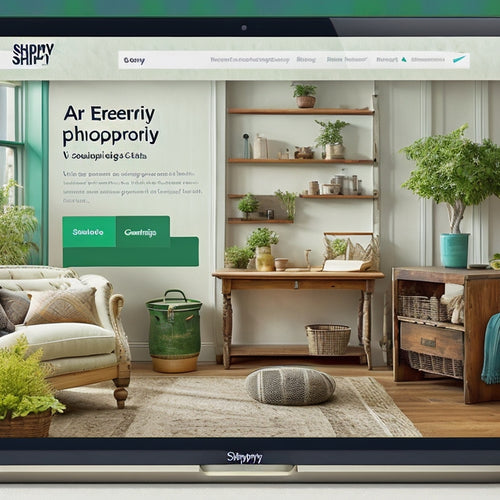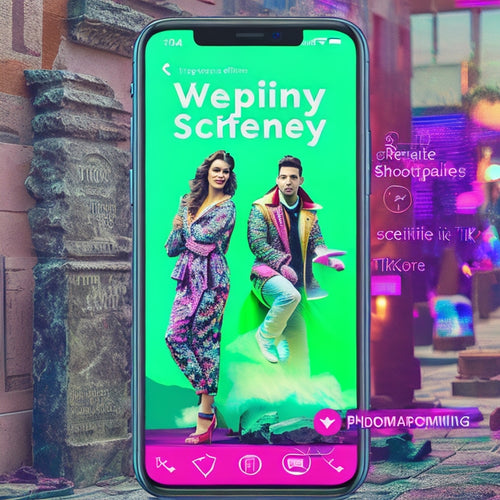Leveraging Ugc for Social Media Marketing
Share
In today's digital landscape, social media marketing has become an integral part of any successful marketing strategy. One powerful tool that marketers are leveraging is user-generated content (UGC), which allows brands to tap into the authentic experiences and opinions of their customers.
UGC has gained popularity as it provides a way for brands to showcase real-life experiences with their products or services. By encouraging customers to share their stories, brands can create a sense of authenticity and trust with their audience. UGC can take many forms, including customer reviews, testimonials, photos, and videos.
Another trend in social media marketing is the use of shoppable videos. These videos allow viewers to click on products within the video and make a purchase directly. This seamless integration of shopping within the video creates a more interactive and engaging experience for consumers.
Shoppable videos have proven to be effective in driving conversions and increasing sales. They provide a convenient way for consumers to discover and purchase products without leaving the social media platform. Brands can also leverage influencers or celebrities in their shoppable videos to further enhance their reach and impact.
This article explores the potential of UGC and shoppable videos in social media marketing. It showcases case studies of brands that have successfully implemented these strategies and provides best practices for effective implementation. By incorporating UGC and shoppable videos into their social media marketing efforts, brands can enhance their engagement with consumers and drive tangible results.
- UGC in social media marketing can lead to increased brand loyalty, higher engagement rates, enhanced consumer participation, and a greater sense of community.
- UGC campaigns like GoPro's 'Photo of the Day' and Lululemon's 'This Is Yoga' have successfully showcased products, generated interest and sales, and improved brand reputation.
- UGC analytics are important in social media marketing as they provide insights into consumer preferences, help identify trends, guide marketing strategies, and optimize campaigns for maximum impact.
- Shoppable videos can drive conversions by allowing viewers to make direct purchases, eliminating extra steps in the buying process, and building trust and credibility through user-generated product reviews or testimonials.
Harnessing the Power of User-Generated Content (UGC)
The use of user-generated content (UGC) has become increasingly prevalent in social media marketing strategies, particularly through the incorporation of shoppable videos. UGC refers to any form of content created by consumers, such as reviews, photos, or testimonials. It has gained significant traction due to its ability to foster authenticity and trust among audiences.
One of the major UGC trends is the rise of influencer marketing, where brands collaborate with individuals who have a large following on social media platforms. These influencers create content featuring the brand's products or services, encouraging their followers to engage with and purchase them. This strategy leverages the trust and credibility that influencers have built with their audience.
Another UGC strategy is encouraging customers to share their experiences with a brand through hashtags or contests. By doing so, brands can collect a wealth of user-generated content that showcases real people using and enjoying their products. This not only provides social proof but also creates a sense of community among customers.
Shoppable videos take UGC one step further by allowing viewers to directly purchase products featured within the video itself. This seamless integration between entertainment and commerce enhances the shopping experience for consumers while generating sales for brands.
In conclusion, leveraging UGC trends and incorporating them into social media marketing strategies through shoppable videos can greatly enhance engagement, build trust, and drive sales for brands in today's digital landscape.
Creating an Interactive and Personalized Experience for Consumers
This discussion focuses on the importance of creating an interactive and personalized experience for consumers. Engaging with your target audience allows you to establish a connection and foster a sense of community, resulting in increased customer loyalty and brand advocacy.
Building trust is crucial as it establishes credibility and reliability, which are essential factors for consumers when making purchasing decisions. Authenticity is also key as consumers value genuine experiences that resonate with their values and beliefs, leading to stronger brand-consumer relationships.
Engaging with Your Target Audience
Engaging with the target audience can be achieved through various interactive strategies in social media marketing. By creating meaningful connections and fostering a sense of belonging, businesses have the opportunity to drive customer loyalty.
One effective approach is to actively listen and respond to customers' comments, questions, and concerns on social media platforms. This shows that the business values their opinions and is committed to addressing their needs.
Additionally, hosting contests or giveaways encourages active participation from followers and generates excitement around the brand. Responding promptly to messages and comments also helps build trust and strengthens the relationship between the brand and its audience.
Finally, incorporating user-generated content into social media campaigns allows customers to feel valued and included in shaping the brand's narrative.
Overall, engaging with the target audience through interactive strategies fosters a sense of community and enhances customer loyalty.
Building Trust and Authenticity
One effective way to build trust and authenticity in social media campaigns is by incorporating genuine customer testimonials. By featuring real customers sharing their positive experiences with a brand or product, companies can establish credibility and gain customer loyalty.
Customer testimonials provide social proof, reassuring potential customers that others have had a positive experience with the brand. This can help alleviate any doubts or skepticism they may have, making them more likely to trust the company and its offerings.
Additionally, by showcasing authentic feedback from satisfied customers, brands can create a sense of belonging for their audience. When people see others like themselves endorsing a product or brand, they feel a connection and are more inclined to trust the company as well.
Ultimately, leveraging genuine customer testimonials can greatly contribute to building credibility and gaining customer loyalty in social media marketing campaigns.
The Effectiveness of Shoppable Videos in Social Media Marketing
Shoppable videos in social media marketing have been found to be effective in increasing consumer engagement and driving sales. With the rise of social media platforms and the growing influence of user-generated content (UGC), shoppable videos have emerged as a powerful tool for brands to connect with their audience and achieve business objectives.
One reason for the effectiveness of shoppable videos is their ability to measure return on investment (ROI). Unlike traditional advertising methods, shoppable videos allow marketers to track metrics such as click-through rates, conversions, and purchases directly from the video. This data provides valuable insights into consumer behavior, allowing brands to optimize their marketing strategies and allocate resources more effectively.
Another reason for the effectiveness of shoppable videos is their appeal to millennials. As a digitally native generation that values convenience and seamless experiences, millennials are more likely to engage with content that offers immediate access to products or services. By incorporating clickable links or buttons within videos, brands can provide a frictionless shopping experience that aligns with millennials' preferences.
Moreover, shoppable videos foster a sense of belonging among consumers. By enabling users to interact with products showcased in the video, individuals feel included in the brand's narrative. This interactive element encourages active participation and creates a deeper connection between consumers and brands.
In conclusion, shoppable videos are an effective strategy for social media marketing due to their ability to measure ROI and target millennials. By leveraging these interactive videos, brands can enhance consumer engagement, drive sales, and cultivate a sense of belonging among their target audience.
Case Studies: Successful UGC and Shoppable Video Campaigns
Successful case studies have demonstrated the effectiveness of incorporating user-generated content (UGC) and interactive video campaigns in driving consumer engagement and sales. Several UGC case studies highlight the power of leveraging authentic content created by users to promote products through shoppable videos.
-
Coca-Cola's 'Share a Coke' campaign: By personalizing their iconic soda bottles with popular names, Coca-Cola encouraged consumers to share photos of themselves with their personalized bottles on social media platforms using the hashtag #ShareACoke. This UGC campaign not only generated millions of user-generated photos but also increased sales by 2% in the US.
-
GoPro's 'Photo of the Day' campaign: GoPro encouraged its users to submit their best action-packed photos taken with their cameras for a chance to be featured as the 'Photo of the Day' on GoPro's website and social media channels. This UGC campaign not only showcased the capabilities of GoPro cameras but also created a sense of community among its users, leading to increased brand loyalty and engagement.
-
Lululemon's 'This Is Yoga' campaign: Lululemon invited its customers to share photos and videos of themselves practicing yoga using the hashtag #ThisIsYoga. This UGC campaign not only promoted inclusivity and diversity within the yoga community but also allowed Lululemon to showcase its products in real-life settings, driving interest and sales.
These successful UGC case studies demonstrate that incorporating user-generated content in shoppable video campaigns can effectively engage consumers, foster a sense of belonging, and ultimately drive sales for brands.
Best Practices for Leveraging UGC and Creating Shoppable Videos
To effectively incorporate user-generated content (UGC) and create engaging videos with purchasing capabilities, brands should follow best practices that enhance consumer participation and drive sales.
One important aspect of leveraging UGC for social media marketing is the use of UGC analytics. By analyzing data related to user-generated content, brands can gain insights into consumer preferences and behaviors, allowing them to tailor their marketing strategies accordingly. This information can be used to identify trends, understand what types of content resonate with the target audience, and optimize campaigns for maximum impact.
Another best practice is driving conversions through shoppable videos. Shoppable videos allow viewers to click on products within the video and make a purchase directly, eliminating extra steps in the buying process. Brands can leverage UGC by incorporating user-generated product reviews or testimonials within these shoppable videos, providing social proof and increasing trust among consumers.
Furthermore, it is essential for brands to actively engage with their audience when leveraging UGC. This includes responding to comments, acknowledging and featuring user-generated content on brand platforms, and encouraging further participation from consumers. By fostering a sense of belonging and community among users, brands can build stronger relationships with their customers and encourage repeat purchases.
In conclusion, by following best practices such as using UGC analytics, creating shoppable videos, and actively engaging with consumers, brands can effectively leverage UGC for social media marketing purposes while driving conversions and ultimately increasing sales.
Frequently Asked Questions
How can brands encourage consumers to create and share user-generated content (UGC) on social media?
Incentivizing consumers through social media contests can encourage them to create and share user-generated content (UGC). By offering rewards, recognition, and exclusive experiences, brands can tap into consumers' desire for belonging and motivate them to participate in UGC campaigns.
What are some creative ways to make shoppable videos more interactive and personalized for consumers?
Interactive features in shoppable videos enhance consumer engagement and personalization. By incorporating features like interactive hotspots, quizzes, and polls, consumers can actively participate in the video experience. Additionally, personalized recommendations cater to individual preferences, fostering a sense of belonging and connection with the brand.
Are there any metrics or data available to measure the effectiveness of shoppable videos in social media marketing?
Effectiveness measurement and impact analysis are crucial in determining the success of shoppable videos in social media marketing. By analyzing metrics and data such as click-through rates, conversion rates, and engagement levels, marketers can assess the effectiveness of their shoppable video campaigns.
Can you provide examples of successful UGC and shoppable video campaigns that have generated significant results for brands?
Successful UGC campaigns and shoppable video examples have proven to be effective in generating significant results for brands. These campaigns engage audiences, increase brand awareness, drive sales, and foster a sense of belonging among consumers.
What are some key tips and strategies for brands to effectively leverage UGC and create compelling shoppable videos?
UGC collaborations and the use of social media influencers are key strategies for brands to effectively leverage UGC and create compelling shoppable videos. By partnering with influential individuals, brands can tap into their loyal following and increase engagement, trust, and ultimately drive sales.
Related Posts
-

5 Best Ways to Scale Ecommerce With Online Courses
You're already crushing it in ecommerce, but you want to take it to the next level. You can do just that by leveragin...
-

SEO Shopify Apps Empower Merchants to Boost Organic Traffic by Enhancing Their Site's Visibility on Search Engines
This article explores the efficacy of SEO Shopify apps in enabling merchants to enhance their website's visibility o...
-

How Do I Promote My Shopify on TikTok
The use of social media platforms for marketing purposes has become increasingly prevalent in recent years. One plat...


